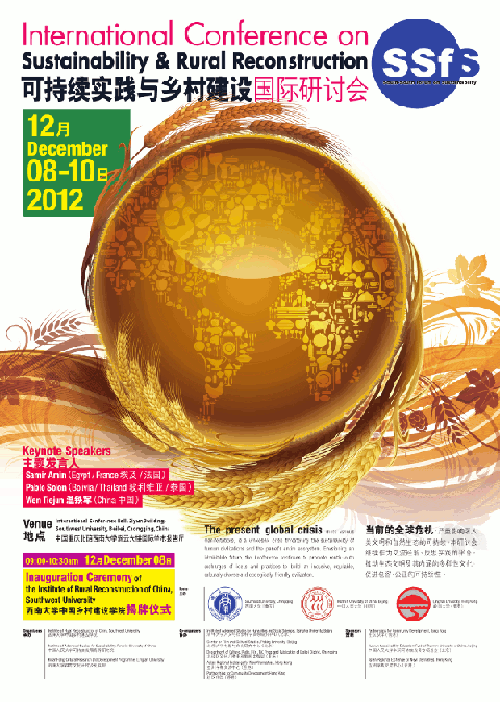Event Title
2012 可持續實踐與鄉村建設國際研討會
Start Date
10-12-2012 9:00 AM
End Date
10-12-2012 10:00 AM
Language
Putonghua
Description
晏阳初先生是世界著名平民教育家,中国乡村建设运动的奠基人,在上世纪20年代初兴起的的中国平民教育和乡村建设运动中,他一枝独秀,在时间上坚持最长,从1926年定县实验开始到1990年逝世,长达70余年;在空间上扩展最广,从中国的华北(河北定县实验县)、华中(湖南衡山实验县)华西(新都实验县、华西实验区)到亚洲(菲律宾、泰国、印度)非洲(加纳)拉丁美洲(危地马拉、哥伦比亚)。他不但长期躬身实践,积累了丰富的实践经验,而且创造了完整的理论体系,被广泛地运用于世界乡村改造运动。
晏阳初的乡村建设的历程,可分为三个阶段。1926年开始的定县实验,标志着晏阳初领导的平民教育运动实现了从识字运动到乡村建设的(即兼及对人和自然环境、社会环境进行综合改造)的重大转折。这是一个质的突破,标志着平民教育运动发展到一个崭新的阶段。到1936年6月,定县实验才因抗日战争爆发而被迫停止。这10年,是晏阳初乡村建设运动的第一阶段。第一阶段的主要成果是创造了“定县经验”,找到了建设中国农村的正确方法,后来被证明也是适合改造世界贫困农村的正确方法。第二阶段包括湖南衡山实验县、四川新都实验县及华西实验区的工作,其中尤以华西实验区的工作为代表,历时13年。第三阶段是从上世纪50年代起将产生于中国大地,由中国人创造的乡村建设理论推向世界大舞台,经受了不同国度的人文环境、自然环境、政治环境的长期考验。这个阶段是以菲律宾的乡村建设为起始,扩展到亚、非、拉广大第三世界国家和地区,从1950年开始到1990年晏阳初逝世,历时40年。
Yang Yangchu was a world famous civil educator, the founder of national rural construction movement. He worked in this field for the longest time among his peers, since 1926’s Ding Xian experiment till 1990 when he passed away; also involved the most extensive range, from Northern China (Ding Xian, Hebei Province), Central China (Hengshan, Hunan Province), Western China (Xindu) to other Asian countries such as Thailand, India, Philippines; Ghana in Africa and Guatemala, Colombia in Latin America. Not only he practiced in the field, but also constructed a set of theories to be applied in the world wide rural reconstruction movement.
His practice can be studied as three phases. The Ding Xian experiment since 1926 was a huge turn-point for the civil education movement, which means that it was no longer limited to teaching people to write and read but to a higher level which included the integral transformation of the people, the nature and the society. It lasted till June, 1936 when the anti-Japanese war broke out. These ten years are the first phase of Yan Yangchu’s practice which created the “Ding Xian Experience”, the right way to build the countryside in China, which latter confirmed to be an approach to modify poor villages in the global level. The second phase lasted another 13 years in Hengshan County, Hunan Province; Xindu County, Sichuan Province and Western China Pilot Zone. The third phase is the promotion of the rural construction theory to the whole world, put into the test of different humane, natural, political environments in different countries. It started in the countryside of Philippines, expanded to other continents and lasted 40 years from 1940 to 1990.
Document Type
Conference
Recommended Citation
晏鸿国 (2012,12月)。晏阳初乡村建设历程。發表於 2012可持續實踐與鄉村建設國際研討會,西南大学,中國重慶市。
Included in
Demography, Population, and Ecology Commons, Growth and Development Commons, Other International and Area Studies Commons, Place and Environment Commons, Sociology of Culture Commons
晏阳初乡村建设历程 = Rural construction practice of Yang Yangchu
晏阳初先生是世界著名平民教育家,中国乡村建设运动的奠基人,在上世纪20年代初兴起的的中国平民教育和乡村建设运动中,他一枝独秀,在时间上坚持最长,从1926年定县实验开始到1990年逝世,长达70余年;在空间上扩展最广,从中国的华北(河北定县实验县)、华中(湖南衡山实验县)华西(新都实验县、华西实验区)到亚洲(菲律宾、泰国、印度)非洲(加纳)拉丁美洲(危地马拉、哥伦比亚)。他不但长期躬身实践,积累了丰富的实践经验,而且创造了完整的理论体系,被广泛地运用于世界乡村改造运动。
晏阳初的乡村建设的历程,可分为三个阶段。1926年开始的定县实验,标志着晏阳初领导的平民教育运动实现了从识字运动到乡村建设的(即兼及对人和自然环境、社会环境进行综合改造)的重大转折。这是一个质的突破,标志着平民教育运动发展到一个崭新的阶段。到1936年6月,定县实验才因抗日战争爆发而被迫停止。这10年,是晏阳初乡村建设运动的第一阶段。第一阶段的主要成果是创造了“定县经验”,找到了建设中国农村的正确方法,后来被证明也是适合改造世界贫困农村的正确方法。第二阶段包括湖南衡山实验县、四川新都实验县及华西实验区的工作,其中尤以华西实验区的工作为代表,历时13年。第三阶段是从上世纪50年代起将产生于中国大地,由中国人创造的乡村建设理论推向世界大舞台,经受了不同国度的人文环境、自然环境、政治环境的长期考验。这个阶段是以菲律宾的乡村建设为起始,扩展到亚、非、拉广大第三世界国家和地区,从1950年开始到1990年晏阳初逝世,历时40年。
Yang Yangchu was a world famous civil educator, the founder of national rural construction movement. He worked in this field for the longest time among his peers, since 1926’s Ding Xian experiment till 1990 when he passed away; also involved the most extensive range, from Northern China (Ding Xian, Hebei Province), Central China (Hengshan, Hunan Province), Western China (Xindu) to other Asian countries such as Thailand, India, Philippines; Ghana in Africa and Guatemala, Colombia in Latin America. Not only he practiced in the field, but also constructed a set of theories to be applied in the world wide rural reconstruction movement.
His practice can be studied as three phases. The Ding Xian experiment since 1926 was a huge turn-point for the civil education movement, which means that it was no longer limited to teaching people to write and read but to a higher level which included the integral transformation of the people, the nature and the society. It lasted till June, 1936 when the anti-Japanese war broke out. These ten years are the first phase of Yan Yangchu’s practice which created the “Ding Xian Experience”, the right way to build the countryside in China, which latter confirmed to be an approach to modify poor villages in the global level. The second phase lasted another 13 years in Hengshan County, Hunan Province; Xindu County, Sichuan Province and Western China Pilot Zone. The third phase is the promotion of the rural construction theory to the whole world, put into the test of different humane, natural, political environments in different countries. It started in the countryside of Philippines, expanded to other continents and lasted 40 years from 1940 to 1990.
